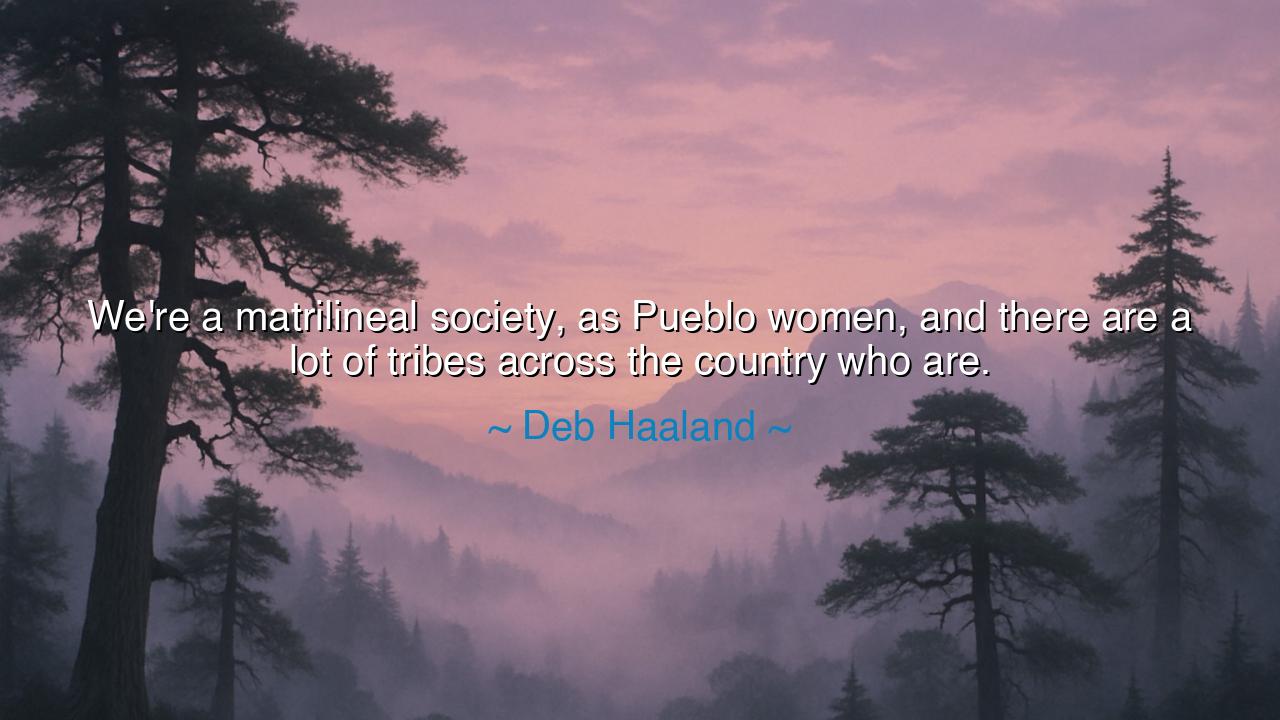
We're a matrilineal society, as Pueblo women, and there are a lot
We're a matrilineal society, as Pueblo women, and there are a lot of tribes across the country who are.






The words of Deb Haaland—“We're a matrilineal society, as Pueblo women, and there are a lot of tribes across the country who are.”—echo with the strength of ancient traditions that endure beyond conquest, colonization, and time itself. She reminds us that there are societies where women are not hidden in the shadows of history, but placed at the very center of inheritance, lineage, and power. In the Pueblo way, it is the mother’s line that carries identity, property, and belonging. This is not merely a social structure—it is a profound recognition that women are the roots of the people, the bearers of continuity and the guardians of land and kin.
The ancients honored the feminine as sacred, the giver of life, the vessel of wisdom, and the keeper of tradition. In many Indigenous nations, this truth was not symbolic but practical. A matrilineal society placed women at the heart of decision-making, not only in family matters but in governance, land, and spiritual life. To be born of the mother was to inherit one’s place in the community, a structure that ensured stability and continuity. Haaland’s words reclaim this truth for a modern world that often forgets: the power of women is not new, it is ancient, and it has guided entire peoples for countless generations.
History gives us luminous examples. Among the Haudenosaunee, or Iroquois Confederacy, clan mothers held the authority to choose and depose chiefs. They were the moral compass of the community, ensuring that leadership served the people, not ambition. When early suffragists like Elizabeth Cady Stanton and Matilda Joslyn Gage encountered these matrilineal traditions, they were astonished to see women wielding such authority, and they drew inspiration from them in their fight for women’s rights. Thus, the wisdom of Indigenous matrilineal societies helped ignite the flames of reform even beyond their own borders.
Deb Haaland, as one of the first Native American women to serve in the highest offices of government, carries this legacy forward. Her acknowledgment of Pueblo matrilineal traditions is not a nostalgic memory, but a declaration: these structures live on, guiding identity and community in the present. In a society that often measures power through patriarchal lenses, her words remind us that other ways of organizing life have existed, and still exist—ways that honor women not as secondary, but as foundational.
This teaching carries deep resonance. For a society that honors its women at the root is a society that nurtures balance. When women’s voices guide decisions, when inheritance flows through mothers, when the future is measured through the line of the feminine, there is a recognition of life’s cycles and continuity that patriarchal structures too often neglect. Matrilineal societies remind us that power is not only about domination, but about care, sustainability, and the weaving together of generations.
The lesson for us is clear: honor the women who carry continuity, wisdom, and strength. Whether or not we live in matrilineal cultures, we can learn from their example. Recognize the voices of women in leadership, in families, in communities. Seek balance in decision-making, for a society that silences half its people cripples itself. The Pueblo way teaches us that when women are at the center, the circle of life holds firm.
Practically, this means giving women full recognition in governance, honoring their role in family inheritance and community memory, and teaching the young that strength is not divided by gender but shared. It means amplifying the stories of Indigenous women and tribes, ensuring that their traditions are not erased but revered as part of the living wisdom of humanity.
Thus, Deb Haaland’s words stand as both reminder and call: “We’re a matrilineal society.” Let us not see this as a curiosity, but as a guiding truth—that societies shaped around the wisdom of women endure with resilience. For in honoring the mothers, the clans, the keepers of lineage, we honor the foundation of life itself. And in so doing, we remember that true civilization is not built upon domination, but upon balance, continuity, and respect for those who carry the generations in their very blood.






AAdministratorAdministrator
Welcome, honored guests. Please leave a comment, we will respond soon